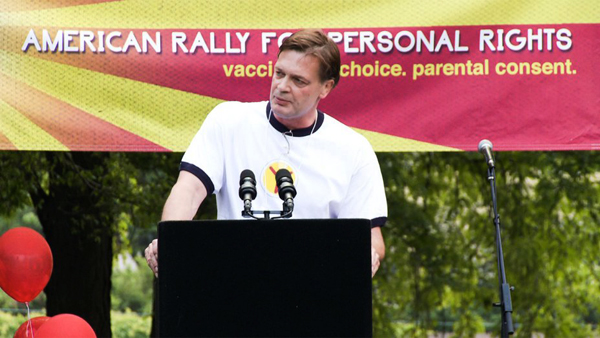The question of whether a common vaccine can cause autism in young children is worthy of a fair-minded documentary to explore. Unfortunately, the largely myopic The Pathological Optimist is not the film to do so.
The main subject is Andrew Wakefield, the notorious former doctor who co-authored a paper, published in 1998, in which he claimed a connection between the measles-mumps-rubella (MMR) vaccine and symptoms of autism. Both he and his research were subsequently targeted by a reporter for The Sunday Times, who wrote an exposé accusing him of trying to manufacture a health scare. The medical journal that published the paper, The Lancet, soon retracted Wakefield’s work, and he lost his license, becoming more or less blacklisted from the medical profession.
The film picks up in Austin, Texas, where Wakefield and his family have relocated from the United Kingdom, and he is suing The Lancet for defamation. He has become something of a cult figure, making promotional appearances for his book, Callous Disregard, during which he rails against the pharmaceutical industry’s sway over all aspects of the medical profession. He clearly has supporters, including parents who lavish him with praise and regard him as a kind of saint or martyr. The film spends just a little bit of time with one of them, though it’s enough for her to get across her point: her child has autism, she knows it was from vaccinations, and she doesn’t care if scientific studies say otherwise.
In the interest of full disclosure, I expected Wakefield to be more like this fan, but despite being at the center of the radical anti-vaccination movement, his own opinions about vaccines turn out to be quite nuanced. Early on, the film quotes directly from the original paper, pointing out that Wakefield never claimed the MMR vaccine definitively causes autism, only that more research needed to be done. There is also a moment at which he looks directly into the camera and says, point blank, that he unequivocally supports vaccinating children for measles, mumps, and rubella. He just believes it should be through individual vaccines.
The film addresses the temporary rise in the number of children without immunization that followed Wakefield’s paper. But rather than deny any connection, he claims the fault is the United Kingdom’s Health Protection Agency, which, around the same time he had called for separate vaccinations, stopped providing anything but the combined MMR vaccine. Here, director Miranda Bailey paints Wakefield as a double victim, who had his words hijacked and twisted by the anti-vaccine fringe and been and deprived of reputation and livelihood by a vindictive medical-industrial complex that made him the scapegoat for a health crisis. Meanwhile, all he wants is to be reinstated as a doctor.
But at the same time, the film touches on conflicts of interest related to his incendiary paper, as well as instances of impropriety regarding the research behind it, and Wakefield is not always able to explain them away convincingly. There was, for example, his filing of a patent to a measles vaccine alternative prior to his Lancet publication. Wakefield claims that even after the subsequent health scare, he told parents to get their children immunized using the individual measles vaccine, yet he still stood to benefit from undermining the integrity of the MMR vaccine. Unfortunately, the film never presses Wakefield hard on points like this.
It also doesn’t offer a plausible argument for why, despite all of Wakefield’s supposedly reasonable explanations, the British courts still mostly ruled against him. In addition, there’s only the barest of lip service paid to the idea of something fishy with his research—just a brief title card mentions that more than 100 studies were carried out in the years after Wakefield’s, and none of them found any connection between the MMR vaccine and autism. But what we hear a lot of is the subject and his wife lamenting how “the fix” is in every time they hit a legal setback.
There’s also a troubling lack of criticism toward anti-vaccine extremists who have rallied around Wakefield’s research and seemingly have provided him a sense of community. This omission hurts Wakefield’s credibility most of all. On the one hand, he claims that the medical profession needs to put patients first again, but at the same time, there’s little regard for the most vulnerable of his patients, innocent children, who are put in harm’s way by parents and guardians who choose to ignore science.
Since Wakefield and his family are so game to call out conflicts of interest where they see it, it’s worth noting that one of the leading anti-vaccination voices in the United States is actress Jenny McCarthy, who as it happens, wrote the foreword to Wakefield’s book Callous Disregard. No conflict of interest there, I’m sure.

















Leave A Comment